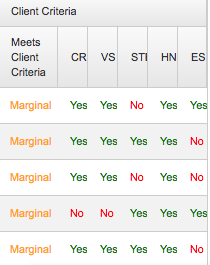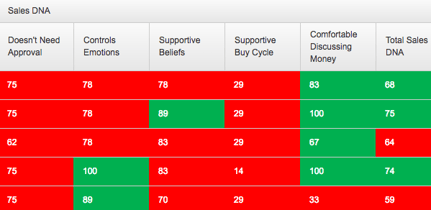In the last 30 days, I’ve talked to more than a dozen company executives, sales

There is further validation of the current finding:
During training discussions over the course of more than 20 years, I’ve asked sales executives, presidents and sales teams to complete the following statement: I (we) would sell more, be more productive, more effective if only I (we) … The #1 most common answer consistently over the years has been “If I had more / better prospects to call on.”
In order to address the problem of
- Will to Sell
- Sales DNA
- Sales Skills
Let me use an example to explain. We are currently working with a financial institution that is hiring a new private banker in an expanded market. Using the pre-hire assessment from our partner Objective Management Group, we created a ‘tailored fit model’ based on the performance of the top and bottom current private bankers and then assessed the 5 candidates they were still considering.
Take a look at these findings:

Figure 1 – How well did the candidates match the clients’ work history criteria for success? The client created a profile that indicated that the non-negotiable sale success criteria
But when we look at the other findings, we find the 3 challenges most common to organizations that are trying to consistently

Figure #2 -When we look at Challenge #1 – ‘Will to Sell’ we find the following:
Only 1 candidate meets all the criteria for Will To Sell. The question becomes: How important is the will to sell when attempting to overcome the challenges of finding qualified prospects to talk to? If 1/3 of your current team lacks the will to sell what is the likelihood - despite all the ‘prospecting’ training you provide them – that they will actually execute? Also note that one of the candidates with strong desire, commitment and outlook will still be prone to making excuses for not prospecting, asking for introductions and networking. (Desire for Sales Success)
Figure #3 – Sales DNA (Sales DNA Audio) findings for the 5 candidates looked like this:

This post won’t go into the definitions of all the criteria you see here but understand that green is good and red is not so good. If you look to the right of the graph and look at the Total Sales DNA the scores in green and red told our client what they needed to know. If everything else is equal in the equation then your people with strong sales DNA are more likely to do the activity of prospecting and will be more successful.
*Candidate #2 meets the criteria of the client, has a very strong will to sell and has the highest sales DNA score. How many of the people on your sales team measure up to this ‘elite’ candidate?
The world of selling is certainly different today than it was just 5 years ago. Your prospects in the market place have more ways to find more information about you, your products and services. They have more ways to compare you against your competition and all of this happens without you or your sales people even making contact. (See ZMOT – Google Research – Zero Moment of Truth).
To meet the challenges of today, you need a sales team with the right stuff.





